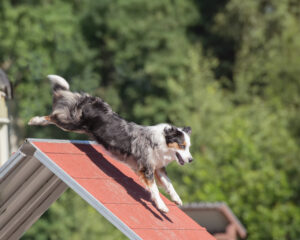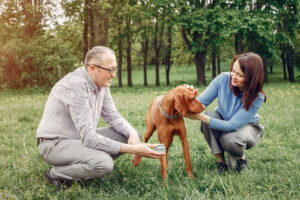The Stafford Dog Blog
Dog Training Legend Nick White gives you the top Dog training content on the web today!

Why Consistency Creates Emotional Security in Dogs
It’s astonishing how even the smallest routines can shape a dog’s emotional well-being. For instance, feeding your dog at the same time each day can reduce their anxiety significantly. Such consistency fosters a sense of predictability, which dogs deeply crave. Historically, dogs have evolved to follow patterns within their packs, relying on consistent signals to

How E-Collar Helps Dogs Who Ignore Voice Commands Outdoors
It’s startling to learn that up to 40% of dogs don’t reliably follow voice commands outdoors. Distractions like squirrels, strangers, and unfamiliar scents can easily overpower the voice of their owners. This is where E-collars come to the rescue, providing a solution that helps bridge the gap in communication. Historically used for hunting dogs, E-collars
Detecting Early Signs of Pain or Arthritis During Dog Training
Every day, countless dogs suffer silently from pain or arthritis, but many owners remain unaware until it’s too late. Early detection during training sessions is crucial, as the repetitive nature of activities can exacerbate underlying issues. A slight change in gait or reluctance to perform familiar commands can be early indicators. Pain and arthritis in

Why Dogs With Strong Obedience Adjust Faster to New Homes
Ever noticed how some dogs seem to settle into new homes effortlessly while others struggle? When dogs have been trained to exhibit strong obedience, their ability to adapt is significantly heightened. This trait not only reduces their stress levels but also fosters a smoother transition into the new environment, leading to a happier and more

The Role of Omega-3s in Supporting Dog Brain Function for Training
When it comes to boosting brain function, there’s a reason Omega-3s are often referred to as “brain food” for both humans and dogs. These essential fatty acids play a crucial role in cognitive development and neural health. For dogs undergoing training, maintaining optimal brain function is paramount to ensure they can efficiently learn and retain

Why Obstacle Courses Build Trust Between Dog and Handler
Ever wondered how an obstacle course can transform the bond between a dog and its handler? Picture a scenario where a handler guides their dog through a series of challenging obstacles, each requiring precise coordination and absolute trust. In every jump, tunnel run, or high climb, both dog and handler must rely on each other’s

How Training Exercises Double as Physical Therapy for Dogs
Swedish researchers found that engaging in specific training exercises can cut the rehabilitation time of injured dogs by up to half. This revelation aligns with tales from dog owners who have witnessed significant physical improvements in their pets after adhering to a structured exercise regimen. Is it possible that a simple obedience drill could replace

Why Advanced Dog Training Requires Shorter but Sharper Sessions
Training a dog for complex tasks is akin to teaching a child advanced mathematics; lengthy sessions can often lead to waning attention and reduced efficacy. Studies have shown that dogs, like humans, have an optimal attention span that peaks with short, intensive training bursts. This approach not only maintains the dog’s interest but also leads

Why Puppies Benefit From Structured Routines Early
Ever noticed how puppies thrive in environments where they know what to expect? This isn’t just by chance; a structured routine provides a sense of stability and security. By understanding what comes next, puppies are less likely to develop anxiety-related behaviors. Historically, dog trainers have emphasized the importance of early routine setting, and with good
